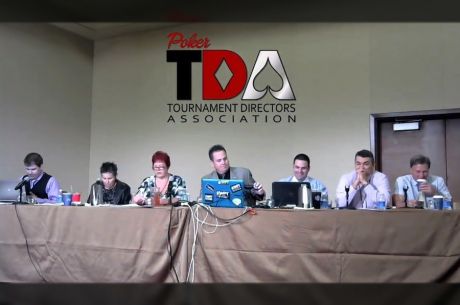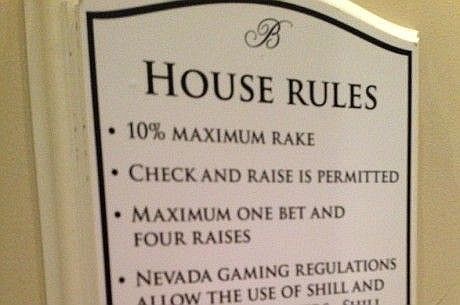Four Things Not to Get Upset About at the Poker Table

Modern life gives us an endless supply of things to be upset about. There��s racism, terrorists, war, a shaky economy, politics, climate change, injustice, just to name a few. Indeed, some speak of the existence of an ��outrage industry�� �� online, cable, and broadcast outlets whose lifeblood is people being angry about this or that, and willing to click, read, or tune in to have their outrage further fueled.
Poker is hardly immune to people getting upset. But rather than provoke your outrage, I��d like to put a little of the Balm of Gilead on it. Here, then, are four things in poker not to get upset about.
1. Bad beats
Here are two perspectives I try to keep in mind when I get spanked with a bad beat. The first comes from Mark Blade��s book, Professional Poker: The Essential Guide to Playing for a Living. The advice appears in a section titled ��Bad Beats Are Your Best Friends.��
��So how should you react when you experience a so-called ��bad beat��?�� asks Blade. ��You should shout inside your head, ��Yippee!�� And do a little mental jig while you're at it. I��m not kidding.��
He goes on to explain why bad beats should be taken as a good sign.
��Bad beats mean that there are still players out there who play badly,�� writes Blade. ��That means the games are still beatable. The day you stop having any more bad beats is the day when you should crawl into a fetal position in the corner of the casino and bawl like a baby. Your career is over. The worst case scenario... has just played out. Your competition all plays as well as you do and you are just passing money back and forth among yourself with only the casino take coming out ahead.��
The second comes from Antonio Esfandiari��s book, In the Money: Strategies for Winning Texas Hold ��em Cash Games.
��If you play poker, bad beats are the cost of doing business,�� explains Esfandiari. ��Take it in stride and move on. If you dwell on it or let it get to you, it can only have a negative impact on your game.��
2. New players
Yes, they��re slow. Yes, they act out of turn. Yes, they inadvertently violate norms of etiquette because nobody has told them what is considered polite and rude in poker. Yes, they ask questions that you think everybody should know the answers to. Yes, their play is so random and unpredictable that you��ll sometimes lose a big pot to a weird hand they should have folded three streets ago.
But think instead of the opportunities. First, there is the immediate and obvious opportunity to take their money right now, precisely because they don��t know what they��re doing, and they will make egregious mistakes.
More than that, though, you have the opportunity to help make their first poker experiences so much fun �� even when they��re losing �� that they��ll come back the next night, and the next, and the next just for the privilege of losing more money to you!
Of course, if you prefer, you can be impatient with their slowness, openly irritated at their ��stupid�� questions, arrogant about how much better you play, mocking of their mistakes, and whiny about the bad beats they put on you. That way you��ll help ensure that they have such a miserable time �� even if they win �� that on the next trip to the casino they��ll decide to stick to craps, because it��s more fun.
Is that really what you want?
3. House rules
When it comes to certain house rules, there are some stinkers out there.
You can��t use your phone even when you��re not in a hand. You have to show your cards to collect the pot, even when everybody else has folded. Your bet doesn��t count unless it��s across a line. We��re taking a rake so big that you can have a net loss on a pot that you win. The number of raises is capped even in a no-limit game. (For more on that last one �� and some other odd rules �� see my recent Casino Poker for Beginners entry on ��Quirky House Rules.��)
But, y��know... so what? You��re playing poker, instead of being cooped up in your cubicle at work, or mowing the lawn when it��s 100 degrees and 200% humidity. Even the stupidest house rules don��t change that essential fact.
By all means, have a friendly chat with the poker room supervisor before you leave for the day, and explain how their bad rule causes problems. Maybe if enough do that, they��ll change it.
While you��re at the table, however, roll with the punches. Take the game as it is presented to you. Don��t let brooding resentment over a dumb rule impede your enjoyment or impair your profit.
4. Dealer errors
You can��t play poker in a casino for even a couple of hours without witnessing at least one dealer error.
For example, you get your first card �� an ace. Your hopes rise a bit. The dealer pitches the second card, but it catches air and flips face up �� and your second ace gets picked up, turned into what will be the first burn card, and replaced by, say, an offsuit six.
What are you gonna do? Get mad about it? Throw your cards at the dealer as his punishment? Throw a hissy fit? Complain to the manager? And just how will any of those things make you any better off?
The dealer already feels bad about it and has apologized, right? Dealers, like most people, take pride in doing their jobs well, plus they like the extra tips that come from excellent performance. Berating them for a mistake does nothing to improve their performance.
Moreover, what does getting mad about it do to you? It indulges your feelings of entitlement. It prolongs the hurt. It clouds your judgment. It ruins your fun. It draws the resentment of the other players who now see you as a childish loser who can��t deal with a minor incident like a mature adult.
Okay, you��re thinking �� that��s true enough for the common dealer errors. But what about the big ones, the ones that cost me a lot of money? For example, there��s a big pot brewing. You have an open-ended straight-flush draw. The dealer burns and turns the river, and it��s one of the two cards you were praying for. You have the stone-cold nuts, and three other players are itching to get their chips in.
But wait �� we discover that action wasn��t quite complete on fourth street. Under the supervision of the floor, your trump card gets shuffled back into the deck. A new river card is put out, leaving you with a broken draw, a worthless hand.
Now can you get upset?
Sure you can. But I ask again: What will it accomplish? They��re not going to go back for a do-over just because you liked the first river card better. No amount of protesting will get back the chips you had already invested. Nothing you say or do will change the outcome of this hand, nor will it change how the poker room handles this occurrence in the future, because it��s all completely standard, by the book.
So you have two choices. You can stew about it, feel sorry for yourself, drone on about how unlucky you are, and stew in your own miserable juices. This will make you even more unhappy than you already feel. You will make worse decisions and probably lose more money.
Or you can do as Taylor Swift urges, and shake, shake, shake, shake, shake it off. Or if she doesn��t do it for you, how about Shakespeare? ��Things without all remedy / Should be without regard: what��s done is done,�� goes the line from Macbeth. Or perhaps your taste runs more for the proverbial. If so, then don��t cry over spilled milk.
Dealers are human, and they will make mistakes. It��s part of the game, just like occasional bad calls from umpires and referees are part of most sports. It��s better for your own mental health and that of everybody around you to accept that with equanimity and good humor. It��s over, and time to be thinking about the next hand instead of the last one.
Conclusion
The next time you feel an impulse to blow up about one of these four things, take a second and reflect on how you want to feel about it �� because, believe it or not, you do have a choice about how you feel. You can choose to wallow in your misery and misfortune. Or you can choose to be unperturbed, with these unpleasant events bouncing off of you like bullets off of Superman.
I recommend the latter.
Robert Woolley lives in Asheville, NC. He spent several years in Las Vegas and chronicled his life in poker on the ��Poker Grump�� blog.
Want to stay atop all the latest in the poker world? If so, make sure to get PokerNews updates on your social media outlets. Follow us on Twitter and find us on both Facebook and Google+!









